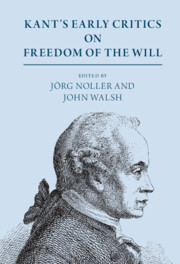Book contents
- Kant’s Early Critics on Freedom of the Will
- Kant’s Early Critics on Freedom of the Will
- Copyright page
- Contents
- Acknowledgements
- Note on the Edition and Translation
- Chronology of the Translated Texts and Kant’s Major Works
- Abbreviations
- Historical and Systematic Introduction
- I Freedom and Determinism
- Hermann Andreas Pistorius, Review of “Elucidations of Professor Kant’s ‘Critique of Pure Reason’ by Joh. Schulze, Royal Prussian Court Chaplain. Königsberg: Dengel, 1784. 8, 254 pages,” 1786
- Johann August Heinrich Ulrich, Eleutheriology or On Freedom and Necessity, Jena, 1788
- Christian Wilhelm Snell, On Determinism and Moral Freedom, Offenbach, 1789
- August Ludwig Christian Heydenreich, On Freedom and Determinism and Their Compatibility, Erlangen, 1793
- II Freedom and Imputability
- III Freedom and Consciousness
- IV Freedom and Skepticism
- V Freedom and Choice
- Appendix: Biographical Sketches
- Glossary
- Notes
- Bibliography
- Index of Persons
- Index of Subjects
Christian Wilhelm Snell, On Determinism and Moral Freedom, Offenbach, 1789
from I - Freedom and Determinism
Published online by Cambridge University Press: 24 March 2022
- Kant’s Early Critics on Freedom of the Will
- Kant’s Early Critics on Freedom of the Will
- Copyright page
- Contents
- Acknowledgements
- Note on the Edition and Translation
- Chronology of the Translated Texts and Kant’s Major Works
- Abbreviations
- Historical and Systematic Introduction
- I Freedom and Determinism
- Hermann Andreas Pistorius, Review of “Elucidations of Professor Kant’s ‘Critique of Pure Reason’ by Joh. Schulze, Royal Prussian Court Chaplain. Königsberg: Dengel, 1784. 8, 254 pages,” 1786
- Johann August Heinrich Ulrich, Eleutheriology or On Freedom and Necessity, Jena, 1788
- Christian Wilhelm Snell, On Determinism and Moral Freedom, Offenbach, 1789
- August Ludwig Christian Heydenreich, On Freedom and Determinism and Their Compatibility, Erlangen, 1793
- II Freedom and Imputability
- III Freedom and Consciousness
- IV Freedom and Skepticism
- V Freedom and Choice
- Appendix: Biographical Sketches
- Glossary
- Notes
- Bibliography
- Index of Persons
- Index of Subjects
Summary
In his 1789 On Determinism and Moral Freedom, Snell treats the compatibility of determinism and morality. Drawing on Kant’s distinction between the empirical and intelligible character, Snell tackles the issue of how the determinism of the phenomenal world can be reconciled with freedom, specifically with respect to the capacity to do otherwise. Anticipating the contemporary charge that intelligible freedom understood as entailing the capacity to do otherwise would contradict the causal connection of appearances, Snell advances a Leibnizian interpretation of Kant’s account of free will and rejects the proposition that an indeterministic conception of the capacity to do otherwise is a necessary condition for moral imputation. He defines freedom principally as the absence of external constraint and argues that this in no way infringes upon the hypothetical necessity of occurrences in the world of sense. Furthermore, Snell maintains that the agent’s consciousness and inner feeling of self that his action is the expression of his own self-activity is all that is required for morality and moral imputation.
Keywords
- Type
- Chapter
- Information
- Kant's Early Critics on Freedom of the Will , pp. 24 - 40Publisher: Cambridge University PressPrint publication year: 2022

